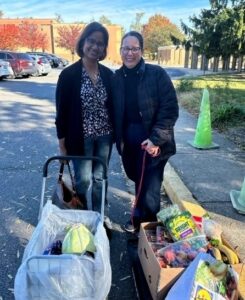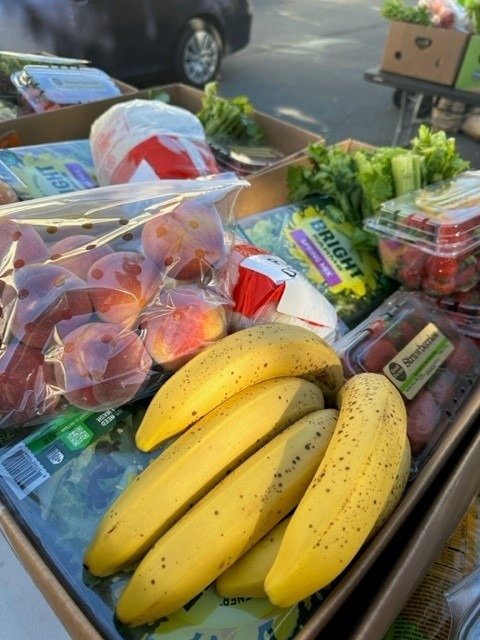
On a fall day at a CAFB community food distribution in Falls Church, Va., Norkris was working her way through a line to pick up a box filled with fresh greens, fruit, and frozen protein. As she did, she shared bit about her life with our team.
Norkris came to the U.S. in 2020 from her home country of Venezuela with her husband and teenage daughter. Before leaving, she had been a teacher and an administrator with a steady job. But in the U.S., she could no longer find that kind of work.
With her husband also looking for employment, she took multiple service industry jobs to help make ends meet. For a long time, she said, she would get up at 4 a.m. to get to her first eight-hour restaurant job in DC, commute to her second job for another eight-hour shift, and then commute back home to Virginia – often arriving at midnight – before doing it all over again the next day. The work was hard on her body, with the long hours on her feet causing inflammation in her feet and legs.
“People like you, who give us help, also give us hope.”
— Norkris, CAFB client
Like so many people in the service industry, Norkris recently had her hours cut back significantly due to changes in the schedule of the restaurant where she worked. Her husband had just found work to help fill in some of the gap, and importantly, his job provided health insurance. But without all of her previous hours, finances are still strained. She said she wasn’t sure about the idea of applying for SNAP benefits, thought that because she is employed, “someone else might need them more than me.”
 Norkris shared that her aspiration is to improve her English language skills so that she can once again have the kind of employment – and self-sufficiency – that she had prior to arriving in the US. She was taking classes to work towards that goal, and was surprised to learn that many community colleges have programs that could help people like her, who are working and older than “traditional” college age, to receive additional certifications.
Norkris shared that her aspiration is to improve her English language skills so that she can once again have the kind of employment – and self-sufficiency – that she had prior to arriving in the US. She was taking classes to work towards that goal, and was surprised to learn that many community colleges have programs that could help people like her, who are working and older than “traditional” college age, to receive additional certifications.
“Everyone in this line can be a professional,” she told me as she gestured at the people there. “We just need some information and some help. People like you, who give us help, also give us hope.”
Norkis’ aspirations are indicative of those held by many people across our region who face food insecurity. According to the CAFB’s 2023 Hunger Report, more than half of those experiencing hunger wish to get a different job that better uses their existing skillset, and even more individuals would like to train to get new skills that would help them get into a different field of work.
Norkris’s story highlights the importance of looking holistically at the needs of our clients. This begins with food, which can help individuals focus on all other aspects of their lives, and extends to other supports like learning and professional training, that can ultimately help them improve their financial circumstances. Her experience is yet another powerful reminder that when we help our neighbors get the assistance they need across a range of areas, we can play an essential part in helping people to fulfill their potential.

